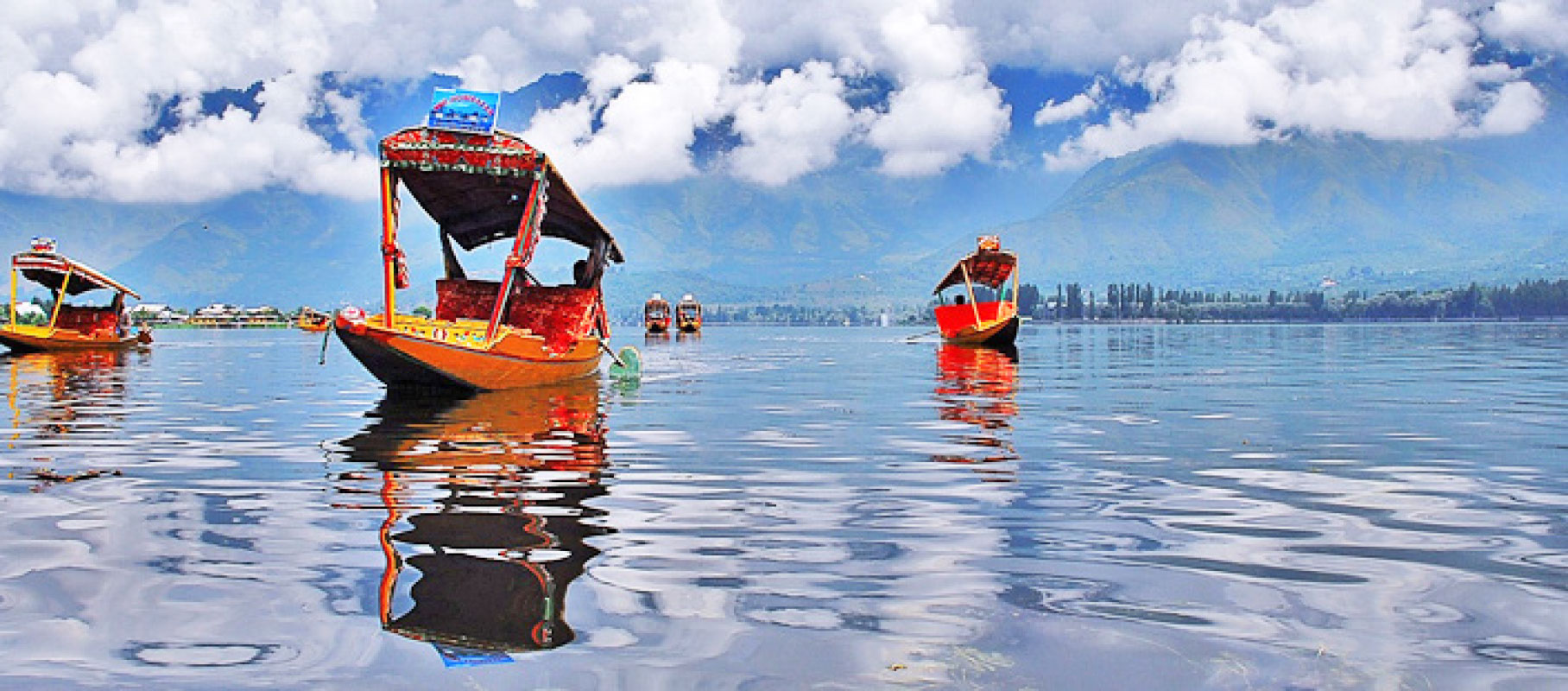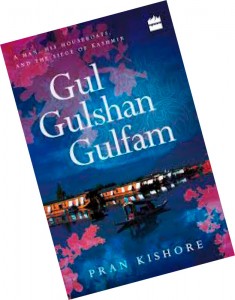Of shikaras and heaven on earth It’s not uncommon for novels to find voice on the big and small screens, but a TV serial becoming a novel? That’s surely unusual.
All these relations originate from these houseboats of ours. Don’t you see how many letters I receive? Letters come from far-off countries across the oceans, where I can never reach. Is there any corner of our own country where we don’t have acquaintances? All this is possible because of these houseboats, which your brothers want to sell.” This passionate and anguished voice belongs to Malla Khaliq, owner of three houseboats on Dal Lake in Srinagar, father of three grown sons and a daughter, belonging to the Hanji community of boating people in Kashmir. For generations his family has lived on water and this is where he sees his children’s future as well. But it is the 1990s and Kashmir is changing. And even though tourism is the bread and butter of this beautiful state’s economy, and houseboats its beating heart, even that is changing.
These sentiments expressed by Malla Khaliq synopsise the over 400-page-long novel by Pran Kishore called Gul, Gulshan, Gulfam, originally written in Kashmiri and translated into English by the well-known poet, Shafi Shauq. And there hangs a tale that’s screaming to be shared. I had not heard of Shafi Shauq until I met him at the Frankfurt Book Fair in 2006 when India was invited to be the Guest of Honour. I was (and still am) ashamed of my ignorance because his is a very powerful voice in Kashmir’s contemporary literary history. As a poet, fiction writer, linguist and critic, he has written in Kashmiri, English, Urdu and Hindi. I had the opportunity to listen to him reciting his poetry in Frankfurt. One of the pamphlets distributed there carried this poem in English translation:
Crossing a street
Crossing a street, I lower my head in case of danger. Sometimes, it’s something’s absence I sense — nothing as tangible as rocket or gun. I must be careful. I cross the street, to find the house where I’d expected it to be not there. I look around in case I’m in a new neighbourhood. Easy to lose your way. It’s easy to lose your way at home, to cross the street and never look back. I lower my head instinctively to protect myself from what I can’t see.
One evening, soon after arriving in Frankfurt, Shafi Shauq was taking a walk by the river Main when he was accosted by an official-looking stranger who demanded to see his ‘documents’. Intimidated by his demeanour and unfamiliar with local practice, Shauq obliged. In a trice, the stranger made off with his wallet. By the time he could gather his wits and report the incident, Shauq’s bank account in Srinagar had been drained of all funds.
When I saw Shafi Shauq’s name as translator, I went online and discovered something Amit Chaudhuri had written in an Indian Express article dated December 2, 2019, entitled ‘The actual Shafi Shauq’: ‘Among those I met was a small, suited Kashmiri poet called Shafi Shauq. The term “Kashmiri poet” carried a mild voltage. I was speechless for an instant, then said, “Hello!” Not that a Kashmiri poet is an impossibility, but that Shafi Shauq represented a concatenation of impossibilities, to do with his presence here, with a resolution to the problem being found, and peace ever being regained. I wanted to study him closely and ask him for forgiveness. He was diffident, as non-Anglophone writers — especially poets — are. Kafka-like, he’d adopted the guise of normalcy — I mean his 20th-century appearance, the black suit, meant to sidestep attention. He was fair; his eyes shone gently. He had lost hair, like a Jewish intellectual.’ He went on, in the article, to refer to the very same wallet-snatching incident.
This is a digression, but it is a digression that connects; it shows how people are attached to each other in a myriad ways, how even a disconnection is a connection because there cannot be a split without a joining to begin with. I came to this novel late; my mother had read it at least a couple of years earlier, perhaps one of the last novels she read before she died. She had loved it; I could see it in the way her eyes shone when she returned the book to me. ‘Very nice,’ she said, adding that she loved reading about things she had known nothing about. ‘And the people are so real,’ she said. So true, I think as I read. Gul Gulshan Gulfam is that rare book that elaborates on the ordinary lives and relationships of ordinary people engaged simply in the business of eking out a living in the only way they know, in the only place they know. To those outside that milieu, this is exotica, but to the Hanji people, this is life, another ‘India’ even if ‘India’ itself is ‘other’ for them.
The extraordinary thing is that this novel was born as a television serial telecast on Doordarshan. In recent times, there have been occasions when films, particularly for children, have been written up as novels. But Gul Gulshan Gulfam is something else, it’s so big that it’s worth recounting the details from something that Pran Kishore himself wrote in an article appended to the book (and published online). The article is titled ‘The Dal formed an indelible imprint on my mind…’ Kishore was a well-known name in theatre circles but he nursed a desire to write a novel because he felt books had a greater impact. His first novel, Sheen Ta Vatapod, published in 1987, had received the Sahitya Akademi Award. He was all ready to write his second.
For this he recalled a time in the 1940s when he ‘rented a small boat at the rate of one rupee per day from the quay of my native place, Chinkral Mohalla, in the city of Srinagar. Taking my childhood friends along, I roved through the Maer Canal of the old city and reached Gagribal in the Dal Lake. It was during this journey that the Dal formed an indelible imprint on my mind and I took an interest in the dwellers of the Dal.’ A few years on, Pran Kishore had the happy fortune of meeting Haji Abdul Samad Kotroo who owned a chain of houseboats in the Dal. As Kishore writes, ‘My interactions with this exceptional human being and his family members inspired me to write about the lives of the boatmen of the lake who have been mingling the sweat of their toil with the waters of the lake for generations. Being a father figure, Kotroo Sahib was venerated by not only the boatmen but also the vegetable growers who dwelt in the marshes around the lake. He had continued the tradition that his father had set — of treating the tourists who would often come to escape the maddening city life to stay in his houseboat, as his own kith. Similarly, Malla Khaliq is conscientious of his duties of making his guests feel at home. This is how the seed of the novel Gul Gulshan Gulfam was sown in my mind…’
Whichever Kashmir comes to your mind, the Kashmir of Hindi films, honeymoons and photo ops, or the Kashmir of terrorism, militancy and separatism, it is nowhere near the whole story. Pran Kishore’s book gives readers a chance to peep into that inner world in which flesh and blood people lead strenuous lives enmeshed in a web of relationships and events in a region of incredible beauty that has been under tremendous political, social and economic pressure for uncountable numbers of years. He gets as close to the life breath of Kashmiris as he possibly can, eschewing along the way the many stereotypes and misconceptions, preconceived notions and historical aberrations that have come our way over the years.
But our story for this column is not yet done because here, now, filmmakers Sunil Mehta and Prem Kishen make their entry. In Kashmir to shoot their film Nai Shirvaani based on a Russian short story called ‘The Overcoat’, they heard Pran Kishore narrate to them the story of Gul Gulshan Gulfam, and promptly purchased its broadcasting rights. Before long, the serial was out and airing, its title song echoing in every Hindi-speaking home, with Parikshit Sahni heading a wonderful team of actors and Ved Rahi directing. Muskurati subha ki aur gungunati shaam ki, yeh kahani Gul ki hai, Gulshan ki hai, Gulfam ki apparently went on to win the Best Title Song Award from the Radio, Television Producers’ and Advertisers’ Association!
Shafi Shauq calls the novel the ‘quintessential mahaakaaviya (prose epic) of contemporary Kashmir. In following the lives of characters belonging to three successive generations of post-Independence Kashmir, and paying proportionate attention to the actions and moral choices of each individual living under specific and sometimes limiting socio-economic and cultural conditions, Gul Gulshan Gulfam emerges as a novel at the cusp of Indian economic liberalisation and Kashmiri identity in flux.’
It’s a tremendously visual narrative, and we now understand why. There are no chapters in the book, only a tiny ink sketch of a shikara or boat, indicating pauses in the telling, thus reflecting the episodic nature of serials. You see how the weather impacts the tourist season, and how tourism is a mainstay. You see competition, exploitation, the pull of traditional practices and nuances of relationships. You see the Khalistan trouble in neighbouring Punjab reducing footfalls into Kashmir. When Khaliq’s eldest grandson returns home from studying medicine in Jaipur, his decision to practice ‘on land’ as against on the lake, deals a body blow to his grandfather. ‘Nisar Ahmed is going to leave this house today and live on land,’ he cries to his childhood friend, Narayan Joo. When the latter urges him to understand that times have changed, Khaliq says, ‘It is easy to lecture. But only the suffering person knows his pangs.’ And there’s suffering in large doses, as also happy events such as births and marriages. There are wonderful descriptions of Srinagar: the majestic Zabarwan mountains rising above the Dal lake, the different parts of the lake each with its own character, the network of houseboats and shikaras, the waterways, the Jhelum, the Mughal Gardens…
The words ‘If there be paradise (heaven) on earth, it is this, it is this, it is this’ generally ascribed to Hazrat Amir Khusrau are widely believed to describe Kashmir when in fact, they’re a comment on Delhi. Hard to believe, but this is what Rana Safvi tells us in her book Shahjahanabad: The Living City of Old Delhi. These words are inscribed in the Diwan-i-Khas at Red Fort: Agar Firdaus bar ru-ye zamin ast / Hamin ast-o hamin ast-o hamin ast. Yet, despite the heavy militarisation, there is little doubt that the beauty of the land and the people of this much maligned region will meet the expectations of this couplet. In the final analysis, that’s exactly what Gul Gulshan Gulfam does, despite the somewhat shoddy editing. For those more interested in the TV serial, do take a look at Rayan Naqash’s article, ‘Why tourists still look for ‘Gul Gulshan Gulfam’ when they visit the Dal lake in Srinagar’ in scroll.in. You must have guessed by now: these are the names of Malla Khaliq’s three houseboats.
The columnist is a children’s writer and senior journalist.


